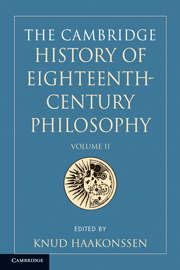34 - Politics
from V - Moral Philosophy
Published online by Cambridge University Press: 28 March 2008
Summary
The fundamental methodological controversy of the eighteenth century also affected the philosophical treatment of political problems, and two major currents, one rationalist and one empiricist, may be distinguished in the many-sided political philosophy of the period. Each of these traditions is of course considerably heterogeneous in itself and includes quite different thinkers who are, however, connected by characteristic family resemblances so that it is permissible to assign them to a single theoretical conception. Rationalist political philosophy is based either on a sort of natural law theory or on a conception of human rights and organises its justificatory arguments within the conceptual framework of contractarianism. Rousseau and Kant are the great protagonists of eighteenth-century contractual political philosophy, but it also includes the political philosophy of early and late German natural law theory, which has to be taken into account as an exceedingly interesting variant of modern contractarianism. Empiricist political philosophy, on the other hand, rejects both the justificatory constructs of the natural state and the normative presuppositions of natural law and human rights theories. Its basic arguments are founded on human interests and needs, on history, on prudence, and on the most profitable development of society. Elements of an empiricist political philosophy may be found in Montesquieu, the father of the modern theory of the separation of powers. The centre of empiricist political philosophy, however, is in Britain; its first great representative was Bernard Mandeville but Shaftesbury and Hutcheson, the inventor of the utilitarian formula of the greatest happiness of the greatest number, also belong to this tradition.
- Type
- Chapter
- Information
- The Cambridge History of Eighteenth-Century Philosophy , pp. 1026 - 1068Publisher: Cambridge University PressPrint publication year: 2000
References
- 1
- Cited by



